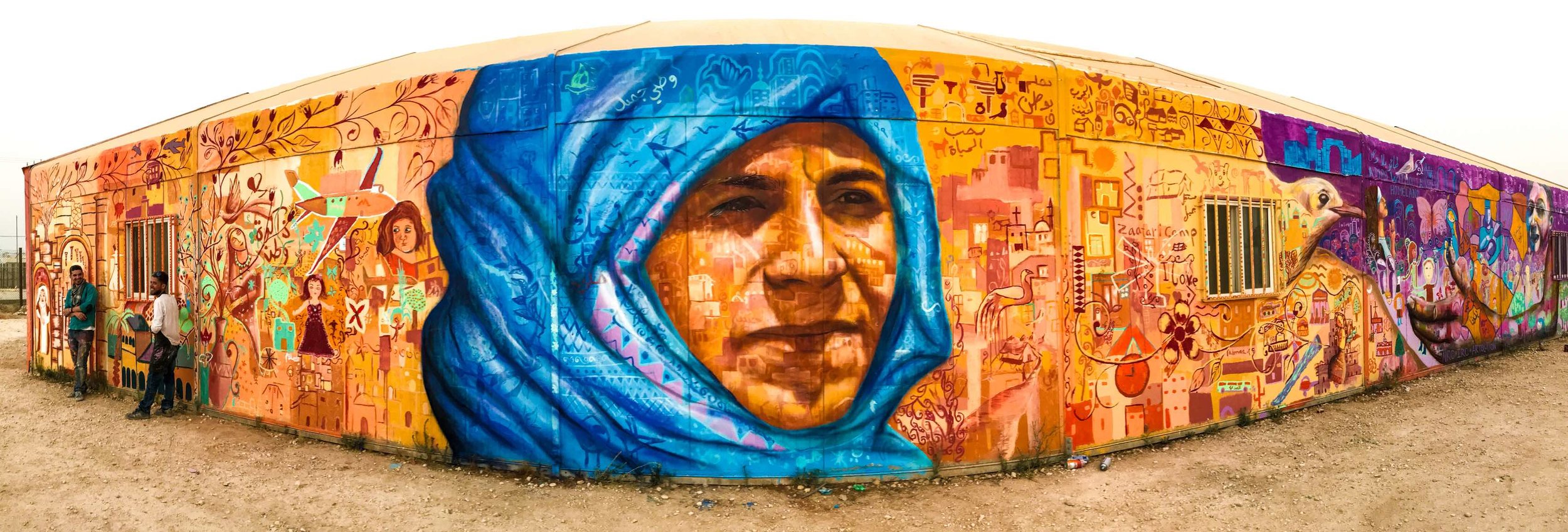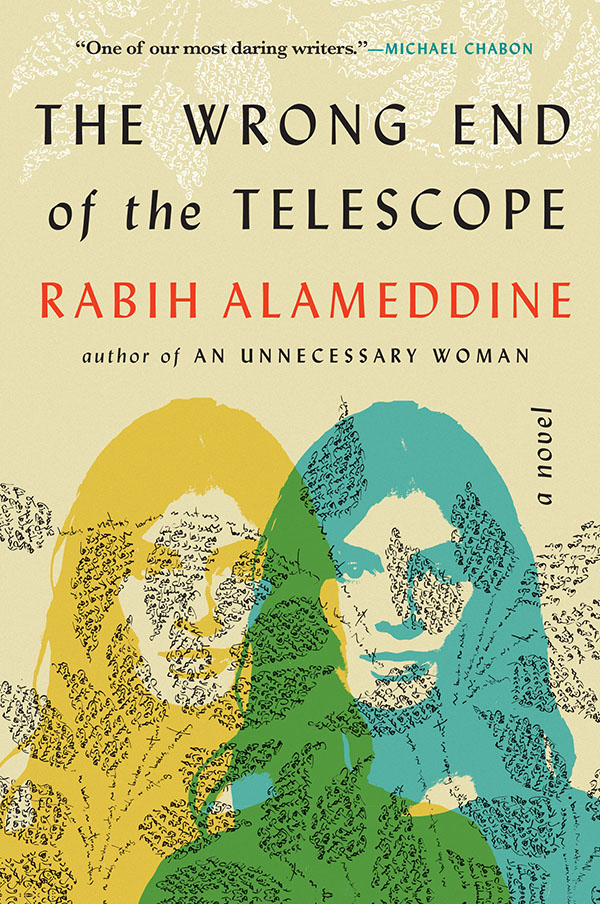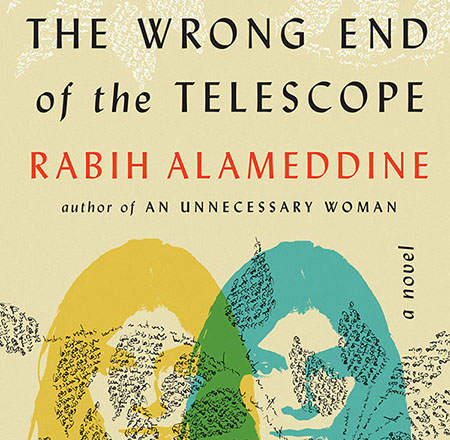
The Wrong End of the Telescope
a novel by Rabih Alameddine
Grove Atlantic (Sept 2021)
ISBN 9780802157805
Dima Alzayat

When in 2018 director Lena Dunham announced she had been hired by producers Steven Spielberg and J.J. Abrams to adapt Marissa Fleming’s nonfiction book, A Hope More Powerful than the Sea: One Refugee’s Incredible Story of Love, Loss, and Survival (2017) into a feature film, the backlash was swift. Some critics were upset that Dunham had not previously expressed any interest in the plight of the Syrian refugees she would now be paid to present onscreen; others were frustrated that someone else hadn’t been hired – surely, someone as privileged as Dunham was not the best choice to represent marginalized voices; still others were resigned to the disappointing truth that refugee stories, especially those that claimed to offer audiences and readers so-called authentic voices and experiences, were now considered timely and could be quickly churned out for profit.
Syrian American author and civil rights lawyer Alia Malek extended her criticism to Fleming’s book. At the time, Fleming was a spokesperson for the UN High Commissioner for Refugees, and Malek took issue with the power dynamic that enabled Fleming to narrate the story of Syrian refugee Doaa Al Zamel, the book’s subject. In interviews, Fleming insisted that without her, Al Zamel’s story would remain untold; the book itself is marketed as giving voice to “unheard voices.” Her narration, Fleming believed, was a force for good: “Stories capture people’s imaginations and have the power to educate, create sympathy and encourage action.”
This dilemma, of who gets to or should try to give voice to the voiceless and whether or not literature really is a force for good, underpins Rabih Alameddine’s latest novel, The Wrong End of the Telescope. It’s a murky undertaking, but Alameddine is not known to shy away from difficult topics. His previous novels, which include Koolaids: The Art of War (1998), An Unnecessary Woman (2014) and Angel of History (2016), deal heavily with the Lebanese Civil War and/or the U.S. AIDS epidemic, and explore how state, cultural and familial values and actions can wreak havoc on individuals and communities.
In The Wrong End of the Telescope, Alameddine plunges headfirst into important questions about empathy and fiction, armed with his signature sharp sarcasm and acerbic humor. “Every idiot thinks they’re a writer, they’re not;” he proclaims in the book’s opening pages. “Every dullard thinks they have a tale to tell; they don’t.” Alameddine is not taking aim at literature he simply dislikes or disagrees with — his is a much more interesting pursuit: What is the point of fiction? What does it do? What can it yield? These queries lie at the heart of his novel, one that takes as its subject the plight of refugees crossing the Mediterranean and those who wait to receive them on the other side.
We meet Lebanese American Dr. Mina Simpson as she arrives in Lesbos, Greece, equipped with her medical skills and a desire to be useful. She has been beckoned by her friend, Emma, a Swedish NGO worker who has promised her she’s needed. But the island is awash with volunteers and a spell of bad weather has slowed boat arrivals to a trickle, leaving Mina to question the necessity of her presence. Being physically close to Lebanon also brings with it a resurgence of difficult memories: Mina has not been to Beirut for 36 years, having been expelled from her family after coming out as a transgender woman soon after moving to the U.S. for college. Emma assures Mina that the “disaster tourists” — many of whom are busy taking selfies and ordering refugees and locals around — will soon leave, and promises to take her farther south where boats are landing despite the storms. This is where Mina meets Sumaiya, a Syrian woman who arrives in a boat with her husband and three young daughters. Mina quickly learns that Sumaiya has terminal liver cancer and is in a lot of pain, and with Emma’s help, sets to work to ensure that Sumaiya’s final days are comfortable and that the dying woman’s wish to see her family resettled somewhere safe is fulfilled.
When Mina moves closer to Moria Refugee Camp to better assist Sumaiya, she encounters other refugees and crosses paths with an unnamed, well-known Lebanese American author — a surrogate for Alameddine himself — who, like her, has come to Lesbos to be helpful but has found himself overwhelmed. Mina addresses the author throughout the novel, and it is through these interlocutions that we learn about her past —her difficult mother, her marriage, and her journey to claim her gender identity — as well as the author’s struggle to create something of value from his work with refugees. After years of volunteering with Syrian refugees in Lebanon, he has attempted to do the same in Lesbos, but feels he has failed. From Mina, we learn of the author’s plight:
You tried to find a way to write about refugees and break the wall between reader and subject. You said you wanted people not to dismiss the suffering, not to read about the loss and sorrow, feel bad for a minute or two, then go back to their glass of overly sweet chardonnay. But you failed, of course. And then the first crack in your veneer. You said, in a whisper, that the only wall you broke was yours.
Mina also directly references Alameddine’s previously published essays on his work with refugees, further blurring the distinction between character and author, fiction and reality.
Like Alameddine’s earlier novels, The Wrong End of the Telescope is fragmented, self-reflexive and intertextual, and immerses readers in shifting perspectives and tangential tales. The form enables Alameddine to incorporate individual refugee stories and thus refuse the tendency to reduce asylum seekers to one nameless, faceless mass. We meet Rania Kasem, a Syrian doctor who “carried herself with an innate elegance” and “lost her husband piecemeal.” We learn about a gay couple from Iraq whose asylum cases were placed on hold because their European processors initially found them “much too masculine.” We are also reminded of heart-wrenching stories, like that of Aylan Kurdi, the drowned toddler whose image made newspaper covers and challenged European consciousness (however short lived), and Baris Yagzi, a young musician found dead on the Turkish shore clutching his violin.
Even as he shares these stories, Alameddine is doubtful of his narration’s value. “How can one make sense of the senseless?” he challenges. “One puts a story in a linear order, posits cause and effect, and then thinks one has arrived. Writing one’s story narcotizes it. Literature today is an opiate.” He turns the finger he points not at others, but at himself. Mina wonders if the author uses people for their stories; “You cared for the tale, not the teller,” she says to him. Alameddine negotiates both the importance and helplessness of witnessing: merely listening “did nothing to ameliorate the situation,” but “doing nothing would have been a crime.”
In his work with Syrian refugees in Lebanon, the fictionalized author, perhaps like Alameddine, is able to keep his distance from his subjects. His interviews with refugees are done with the help of a UNHCR handler. “I was able to listen dispassionately, impersonally. They were stories after all, simply stories.” But in Lesbos, he finds himself at a loss at how to capture and convey these stories – the reason why, a mystery even to himself. “Metaphor seems useless now, storytelling impotent.”
In her most recent book, Writing and Righting (2021), literary historian Lyndsey Stonebridge argues that while reading might make us more empathetic, our empathy is suspect and does not manifest in progressive change. “When a writer or journalist says he is ‘giving voice’ to a refugee by including her story in his prose, what he is probably doing is casting her in a narrative that re-makes her life in a form he, and his readers, recognize as human because they’re familiar with that particular genre of being human.” In such instances, the writer achieves little more than to compel the reader to pity the refugee, while reinforcing the power dynamics that separate reader from refugee.
In short, writing and reading literature that elicits empathy is not meaningful nor useful in and of itself. Yes, such literature can lead people to feel more, to care more. It can help to challenge opinions and perhaps shift perspectives. But these shifts do not necessarily lead to the radical changes such literature often purports – or is assumed – to make. Furthermore, the imperative to create such literature can compel writers to harvest the experiences of the most marginalized among us to allow the most privileged to pat themselves on the back for inhabiting such unfortunate characters, if only temporarily.
It is this sentiment that Alameddine both agrees with and struggles against. “Empathy is overrated,” the novel’s unnamed author laments. Creating literature that will only act as “an emotional palliative for some couple in suburbia” is of little value to him. His goal, like Alameddine’s, is not to use refugee stories, like Sumaiya’s, to teach readers how to care about others. He is aware that what is needed is resources, and in one of the novel’s most powerful scenes, Mina and her companions convince the reluctant author to join them for an after-dinner stroll to the Mytilene Port where refugees wait to board the ferry to Athens. There, they encounter a group of teenage boys who quickly surround the author, eager to talk to him, show him their YouTube videos, and share with him their hopes for the future. When the author learns that the boys are stuck at the port, unable to afford passage, he makes his way to the ticket office to buy as many tickets as he can afford. Mina and the others in the group contribute what they can. Stonebridge writes that “[t]he kind of writing that has the best dialogue with human rights punctures moral self-regard with truth.” In this scene, Alameddine demonstrates the value of listening, of witnessing, of acknowledging others’ stories so they feel heard and less alone. But he also recognizes that this, on its own, without action that results in material change, will never be enough.




